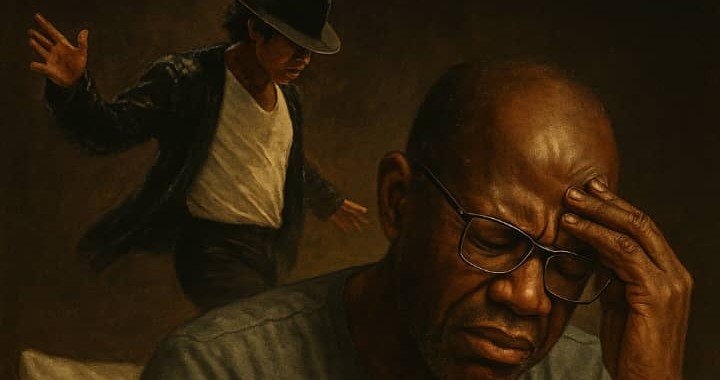By Isaac Christopher Lubogo
I do not cry because someone hurt me.
No.
I cry because I hurt myself.
Once upon a time, I was the Michael Jackson of our days. Not by voice, but by motion—oh, the motion!
Backstroke? Youth play.
Tumble turns? A daily routine.
Backflips? I did them with a swagger—even in tight trousers.
There was rhythm in my knees and fireworks in my back.
My joints sang songs of elasticity. My spine? A steel rod forged in the fires of African agility.
But today—yes, today—here I lie, bedridden by a mere sneeze.
A sneeze!
Not a car accident. Not a boxing match.
Just…
A.
Simple.
Sneeze.
And not in the wilderness of Gadumire or the dusty heat of Kampala—
But in Europe, the land of so-called “first-class medicine.”
A place where ambulances arrive in three minutes and tea is served with a diagnosis.
Still, I lay broken… not by calamity, but by a humble nasal rebellion.
When I returned to Africa, I thought perhaps I’d heal in the land of my ancestors—where even broken bones recover in herbal steam and whispering prayers.
But no.
I woke up—woke up!—from peaceful sleep and suddenly:
My neck refused to turn.
My head throbbed like unpaid debts.
And my eyes?
Once hunters of fine print—now they squint, rebel, blur.
I can no longer read phone texts without glasses the size of Ugandan national binoculars.
And then there is the sex—
Ah, the bitter paragraph in the autobiography of manhood.
Gone are the days of thunder and stamina.
Now? One round feels like a PhD defense.
My body has filed early retirement notices on the activities it once celebrated.
I now approach love with the caution of a bishop—spiritual, theoretical, and brief.
And food?
Even simple greens—yes, greens—betray me.
They wedge themselves between my teeth like uninvited tenants, pricking my gums as though I had gnawed raw goat.
So I confided in my dear friend Timothy.
And what did he say?
With the dispassionate grin of a man watching a chicken attempt flight, he muttered:
> “Oba waziina nnyo nga okyali muvuubuka.”
(Loosely: Perhaps you ‘danced’ too much in your youth.)
What a comment.
I nearly told him: “Olimutuumbaavu.”
(I shall not translate—for indeed, the devil is in the details.)
But I held back. The aged are not quick to fight. We conserve energy for tomorrow’s battles—which might simply be standing without groaning.
These days, I fear even the things I used to laugh at:
Sneezing—a potential spinal injury.
Running—a direct invitation to a knee conference.
Carrying heavy bags—an automatic referral to the stretcher committee.
Even laughing too hard feels dangerous; my ribs now have opinions.
So when I see people like Museveni still walking tall, or Moses Ali still speaking with military bass, I ask myself in Luganda:
> “Bakikola batya?”
(How do they do it?)
What ancient herbs are they chewing?
What fountain of youth are they sipping?
Or do their suits come with orthopedic linings?
And then you hear the whispered wisdom of old men:
> “Omusaajja okadiwa nsawo.”
(A man is only as old as his wallet.)
But the real tragedy came not from my joints, but from an intellectual brother on our Makerere University Law Forum.
One day he asked:
> “Naaye bulaadi, ozinaako ddi?”
(Loosely: My brother, when do you ever ‘dance’? You know—the other kind of dancing, like John Blaq’s ‘Njagala bili ebyalagirwa’…)
It wasn’t a question of biology.
It was suspicion.
He wondered what fuels this endless writing, this refusal to slow down.
I replied simply:
> “Guundi nvaako.”
(Leave me alone.)
The “him” is not Museveni. Not Mandela.
It is the unnamed fire inside all of us—that stubborn refusal to quit even as the body files for bankruptcy.
This is not about “twalyaako bye twalya”—as Elly Wamala sang—
“Ebyasigala bya musaayi muto.”
(What we ate back then is enough; what’s left is for the younger ones.)
It’s not about the meat, the millet, or the milk of youth.
It’s about time—that betrayal.
That slow, silent thief that steals your spine before it steals your pride.
That replaces your abs with questions.
That turns former lions into tame house cats of routine and medication.
So I cry—not for pity.
But for memory.
For the days when dance was therapy. When the body obeyed. When age was a joke for others.
Now?
I sit. I ponder.
I listen to Kasongo Yee Yee—Mobaali Nanghai by Elly Wamala.
And in those guitar strokes, I hear my youth waving goodbye—
Smiling… tumbling… backflipping… fading.
Advice to the Young, the Aging, and the Proud
1. Do not waste your youth mocking the old.
One day, your back will file its own complaint.
And you will sneeze your way into a hospital bed.
2. Record your laughter. Archive your agility.
One day, you will need proof that you were once fire.
3. Eat well, sleep better, and value peace.
For when your knees betray you and your memory fades, only peace will remain.
4. Guard your words to friends like Timothy.
They speak with hindsight but not with your pain.
5. Forgive your body.
It gave you its best when you danced at midnight and sprinted without reason.
And when you cry—let it not be weakness.
Let it be an honourable mourning
For the golden age of your muscle and mischief.
Because sometimes, the greatest tragedy…
Is simply waking up in pain—
From the crime of sleeping.








